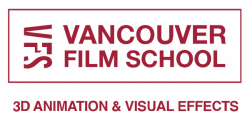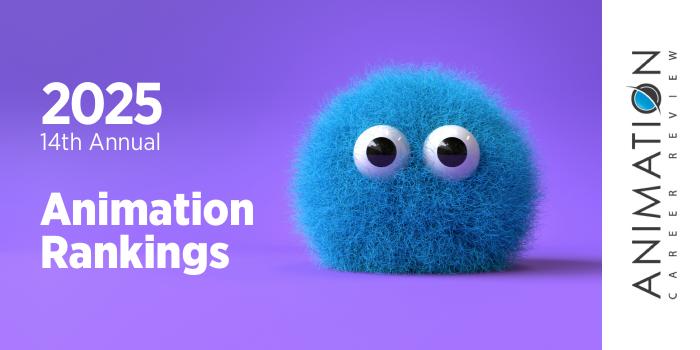
The bottom line – Vancouver Film School gets you into the industry in 12 months, faster than all 4-year programs. Learn 3D & VFX quickly so you can start gaining experience and working immediately. Learn More.

| Ranking | School | City |
|---|---|---|
| 1 | DigiPen | Redmond |
| 2 | University of Washington | Seattle |
| 3 | Academy of Interactive Entertainment | Seattle |
| 4 | Evergreen State College | Olympia |
Our 2025 ranking -our fourteenth annual- of the top animation school programs in Washington. For an explanation of the ranking criteria, click here.

DigiPen has international partnerships with Princess Nourah bint Abdul Rahman University in Riyadh, Kingdom of Saudi Arabia; Keimyung University in South Korea; The One Academy in Kuala Lumpur, Malaysia; and Thammasat University in Thailand. These partnerships help foster the fields of animation, game design, computer science, engineering, and more.
DigiPen is also a Certified Partner of SideFX and the first school in the world to offer a bachelor’s degree in video game programming. SideFX is the Toronto-based company that developed Houdini—the 3D procedural software for film, TV, and game development. Houdini is the preferred software for major studios such as Pixar, DreamWorks, Disney Animation, Sony Pictures Imageworks, Industrial Light & Magic (ILM), DNEG, MPC, and many others.
Other DigiPen features include intensive programs for artists seeking degrees in art, engineering, design, and technology; interdisciplinary team-based projects that last anywhere from a semester to a year; courses taught by accomplished artists who have worked on projects for Lucasfilm and Disney Animation Studio; and the opportunity to study abroad at the DigiPen campuses in Singapore or Spain, or at any partner institute.
Program options for animators include the Digital Art and Animation BFA, and the Digital Arts MFA. The BFA is a competitive program designed for artists looking to enhance their skills. Students will explore areas such as 2D and 3D animation, computer graphics, storytelling, digital sculpting, drawing, and production pipelines. Course examples include Animation I-III; Film History; Introduction to Scripting and Programming; Visual Development for Production; Game History; Storytelling; 3D Digital Art Pipeline; and Cinematic Project I-III.
In the junior year of this 126 credit-hour program, students will create a specialization of their choice from Digital Art and Animation electives, and open electives.
The Digital Art and Animation BFA is available at all DigiPen campuses. The program culminates with a final project and presentation.
The DigiPen Digital Arts MFA is a 60 credit-hour program designed for students with formal training in animation, composition, 3D modeling, color theory, digital painting, and drawing. This means, the program focuses heavily on advanced training in 2D or 3D digital art production.
Course examples for the program include Art Research Methodology; 3D Concepts and Production; Conceptual Design and Illustration; Advanced Character Creation; Organic and Hard Surface Modeling; Art Production Process; Physics for Animation and Modeling; Digital Arts Survey and Analysis; Storyboarding; Character Design’ and Management for Art Directors. Free electives and independent study provide opportunities for students to customize a specialization.
The Digital Arts MFA program culminates with the thesis project, completed over two courses. The Thesis Pre-Production course lasts one semester. For the final two semesters of the program, students will work with a faculty advisor to complete the final Thesis Project course. Throughout the program, students will also work in teams to create several animated films, games, live-action films, or other works.
Graduates of the Digital Art and Animation BFA, and the Digital Arts MFA programs at DigiPen are prepared to pursue roles across the entertainment industry, for leadership roles across industries, or to launch their own studios and freelance businesses.
Over the years, DigiPen graduates have earned more than 300 awards and festival selections; they have won approximately 230 awards for game projects and academic papers; and they have helped develop more than 2,000 commercial game titles.
DigiPen alumni have been hired by more than 1,250 companies worldwide. Examples include Electronic Arts (EA), Nintendo, DreamWorks, Sony, Microsoft, Amazon Games, Walt Disney Imagineering, Zynga, Google, Blizzard Entertainment, Warner Bros. Games, ArenaNet, Apple, Riot Games, and Meta.
DigiPen was established in 1988 as a computer simulation and animation company in Vancouver, British Columbia. Today, DigiPen is an institute of technology that serves over 1,000 students across campuses in Redmond, Washington; Singapore; and Bilbao, Spain. Programs include 10 undergraduate and graduate degrees in Computer Science, Digital Art and Animation, Engineering, Game Design and Development, and Music and Audio. DigiPen is accredited by the Accrediting Commission of Career Schools and Colleges (ACCSC).

University of Washington (UW) is home to the Paul G. Allen School of Computer Science and Engineering. Established in 1967 as an intercollege graduate program, the Allen School employs approximately 100 full-time faculty and 130 technical and administration staff members that serve more than 2,900 students. Housed across the six-story Paul G. Allen Center for Computer Science and Engineering, and the Bill and Melinda Gates Center for Computer Science and Engineering, programs in the school lead to a BS, MS, BS/MS, or PhD.
All Allen School programs are highly interdisciplinary, with access to three main labs including the Animation Research Labs (ARL); the Center for Game Science; and the UW Graphics and Imaging Lab (GRAIL). Activities and events within the labs explore animation, visualization, graphics, computer game science, and vision.
For students seeking a program that specializes in animation, the Allen School has BS degrees in Computer Science (BS CS) and Computer Engineering (BS CE). Graduate options include a PhD and Professional Master’s Program (PMP) in Computer Science and Engineering (CSE). Across programs, students have access to courses such as Computer Animation; Story Design for Computer Animation; Computer Graphics; Advanced Topics in Digital Animation; Advanced Digital Design; Computer Vision; Digital Sound; Trends in Computer Graphics; and Data Visualization.
Students in all Allen School programs will work in interdisciplinary teams to complete the Animation Pre-Production and Animation Capstone courses. Students will also have opportunities to gain experience through the UW Internship Program, and study at one of UW’s four overseas partner universities. These include KTH Royal Institute of Technology in Stockholm; ETH Zurich; Saarland University in Saarbrücken, Germany; and École Polytechnique Fédérale de Lausanne (EPFL), Switzerland. Allen School students can fulfill elective and general education requirements through hundreds of other study abroad options.
Graduates of the Paul G. Allen School of Computer Science and Engineering at University of Washington are prepared for careers in animation, game design and development, film and video, mobile app development, human-computer interaction, architecture, software development, artificial intelligence (AI), and more.
Program alumni have been hired at major companies and studios such as DreamWorks, Industrial Light & Magic (ILM), Microsoft, Pixar, Blizzard Entertainment, Disney, Nickelodeon, Google, Adobe, Sony Pictures Imageworks, Epic Games, Intel, Nintendo, Amazon Studios, NCSoft, Bungie, Weta FX, Titmouse, Unity, and Meta.
University of Washington encompasses more than 500 buildings, over 20 million gross square footage of space, and more than 26 university libraries. Founded in 1861, the school also serves approximately 62,765 students, making it the largest university in the state. With three campuses in Seattle (main), Bothell, and Tacoma, UW provides more than 480 programs leading to over 850 degrees. Programs are housed across 18 colleges and schools.
University of Washington is accredited by the Northwest Commission on Colleges and Universities (NWCCU). The school is also a member of the Association of American Universities (AAU). Engineering at UW is accredited by the Accreditation Board for Engineering and Technology (ABET).

Academy of Interactive Entertainment (AIE) is a Houdini Certified School that provides programs in 3D Animation and Visual Effects (VFX); Game Art and Animation (GAA); Filmmaking; Game Design and Production; and Game Programming. Programs are hands-on and industry focused, with learning activities that take place in a collaborative studio-environment led by accomplished industry professionals.
AIE has close relationships with major animation and game design studios, which provides additional opportunities to gain hands-on experience in real-world environments. AIE students also benefit from state-of-the-art production studios outfitted with the latest industry software and tools; participation in workshop days; immersive courses that allow students to begin animating and designing games from day one; and an active graduate placement division.
While all AIE programs can help prepares student for careers in animation, the most ideal options include the Advanced Diploma’s in 3D Animation and VFX, and Game Art and Animation. Both programs are completed in two stages. During stage one, 3D Animation and VFX students will explore subjects such as character animation; modeling and texturing; storyboards; digital lighting and compositing; and production planning. Stage two covers visual effects and story development. In this stage, students will also select a specialization.
The culminating experience for the program is the production of an industry-ready short film and online portfolio. AIE 3D Animation and VFX graduates are prepared to pursue roles in industries such as animation, filmmaking, and game design and development.
In stage one of the AIE Game Art and Animation program, students will explore animating characters, designing game levels, creating creatures, and world building. Students will also produce a short animated film. In stage two, GAA students will work in teams to build a professional showreel of animation, 3D modeling, and a game level. The program culminates with the production of a playable game.
The 3D Animation and VFX and the GAA programs can be completed in two years, full-time. Program alumni have established careers at major game studios, independent studios, and as entrepreneurs. They also work in health care (serious games and simulations), defense, education, for mining companies.
Academy of Interactive Entertainment graduates have worked on productions and games such as Dungeons & Dragons; Batman; Star Trek: Lower Decks; Godzilla vs. Kong; The Mandalorian; DC League of Super-Pets, Thor; Avengers: Infinity War; Grand Theft Auto; Peter Rabbit 2; Guardians of the Galaxy; Call of Duty; Spider-Man: No Way Home; Moving Out; The Sims; Dune; and World of Warcraft.
Academy of Interactive Entertainment (AIE) was established in 1996. This non-profit college spans four campuses in Australia, two in the U.S. (Seattle and Lafayette), and an Online campus. The school serves an estimated 150-200 students enrolled in programs leading to a bachelor’s degree or advanced diploma. AIE is accredited by the Commission of the Council on Occupational Education (COE).

Matt Groening, creator of The Simpsons and Futurama is one of Evergreen State College’s most famous alumni. The school’s flexibility and unique approach to education attracts many artists interested in cartooning, animation, filmmaking, illustration, and more. Instead of specific course requirements, Evergreen students will work with an advisor to select 180 credits to earn a BA/BS, or 225 to earn a BAS. With small class sizes, all “programs” emphasize immersive learning; collaborative and independent studio experiences; and one-on-one interactions with faculty.
To enhance coursework, students have access to internship opportunities that require a year-long commitment through the fall and spring semesters; over 150 study abroad experiences in more than 65 countries; and production that takes place in state-of-the-art labs and studios designed for all creative endeavors. Students will have near 24/7 access to facilities and spaces such as five large 2D and 3D studios; a drawing studio; a Computer Applications Lab known; and media services labs for 2D and 3D animation, stop-motion, audio and video production, and photography. Examples include the Center for Creative and Applied Media; Photoland; and the Multimedia Lab (MML).
For students interested in Animation, Evergreen State College suggests selecting Flim, Video, and Audio Production as a field of study with a Visual and Media Arts path. Launched in 2023, Visual Media Arts provides access to courses such as Figure Drawing; Cameraless Animation in 16mm and 35mm; Motion Graphics; Cyanotype Animation Project; Physical Computing in the Arts; Audio Post-Production for Film and Television; Philosophy of Art, Media, and Design; Storytelling, Play, and Literacy; Advanced Studio and Music Production I-III; Art History; and Introduction to Programming: Python I-II.
All programs at Evergreen State College are full-time, with a required final project as the culminating experience for creative paths. Graduates of these customized paths are prepared to pursue roles in animation, game art and design, illustration, video production, art direction, television production, graphic design, and advertising. Program alumni may also pursue graduate studies at Evergreen State College or other institutions.
Evergreen State College is Washington’s only four-year college founded in the 1900s. Established in 1967, and serving approximately 2,500 students, Evergreen provides BA, BS, BAS, MPA, MIT, and MES degrees across 45 fields of study. The school also provides 11 “Pre-Built” paths and 30 certificate programs. Evergreen State College has been continuously accredited by the Northwest Commission on Colleges and Universities (NWCCU) since 1974.